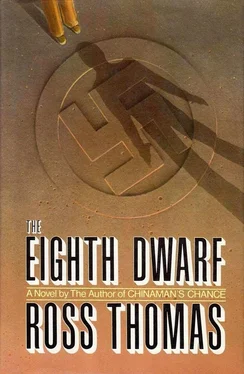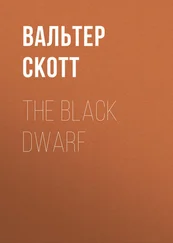The dwarf and two young women called Dot and Jan were down at Union Station the next day at noon to see Jackson off for New York. Dot and Jan had put on, a rather interesting exhibition for Ploscaru and Jackson the night before in the dwarf’s room at the Willard, and as far as they were concerned, the party hadn’t stopped. Jackson, who had a slight hangover, wished that they hadn’t come and was struggling to be polite.
The dwarf had presented Jackson with a going-away present — a thin, curved, very expensive silver hip flask that contained a pint of bourbon — bonded, the dwarf had assured him. Jackson thanked Ploscaru graciously and then turned to Dot and Jan.
“I wonder if you would excuse us for a moment, ladies,” Jackson said, and made himself smile. “Business.”
“Sure, Minor,” Dot said. She took Jan by the arm and they wandered off, trailing giggles behind them.
When they were out of hearing, Jackson looked down at Ploscaru and said, “You’ve got Leah Oppenheimer’s address — the one where she’ll be in Frankfurt.”
“Yes.”
“We’ll meet there.”
Ploscaru nodded.
“I won’t ask again how you’re going to get there.”
“No,” Ploscaru said. “Don’t.”
“But I’ve got a couple of points to make.”
“I’m anxious to hear them.”
“I’ll bet. But point one is: don’t lie to me anymore, Nick. Not ever.”
Ploscaru sighed. “That will be hard. It’s habit, you know. But I’ll try. I really shall.”
“As I told you last night, they’re going to try to run me — and through me, you.”
“Yes, I wasn’t at all surprised by that.”
“So here’s my second point. I don’t really trust you, Nick.”
The dwarf smiled. “How wise.”
“So when we get to that time or place, which I’m sure we’ll get to, where you think you can make a few extra bucks simply by fucking me up, well, here’s some advice. Think twice.”
The dwarf, dusting off his hands, and unaware that he was doing so, stared up at Jackson thoughtfully for several moments. “Why, yes, Minor,” he said slowly, “now that you mention it, I really think that I shall. Think twice, that is.”
That evening around 5 in New York, Jackson called his father from the New Weston Hotel. After the father had expressed surprise about the son’s being in New York, he had said, “You say you’re leaving tomorrow?”
“Yes.”
“Well, I suppose we could have dinner tonight.”
“All right.”
“The New Weston suitable? The food’s not too bad there.”
“Fine.”
“Shall we say seven?”
“Sure. Seven.”
The elder Jackson’s name was S. H. P. Jackson III, and he came from a long line of distinguished but generally impoverished New England parsons. The initials stood for Steadfast Honor Preserved, and rather than attend Yale Divinity, as had generations of Jacksons before him, he had gone to Harvard Law, quickly established himself in a dull but lucrative practice, married the first rich woman who would have him, and named his only son Minor after a favorite black-sheep uncle who had sailed out of Boston for Singapore in 1903 and had never been heard from since. Father and son had addressed each other only as “you” for nearly as long as either could remember.
The elder Jackson, like his son, was tall and spare, but in recent years he had acquired a slight stoop, which, along with his also newly acquired rimless glasses, gave him a somewhat fusty, almost professional air.
What is he now, Jackson wondered, as he shook hands with the older man: sixty, sixty-two? He was thirty when I was born, so that would make him sixty-two, almost sixty-three.
After being shown to their table, the elder Jackson retired behind his menu, peering over it occasionally to address either comments or questions to his son.
“You’re looking well,” the older man told his son. “Nicely tanned, I see. California must have agreed with you.”
“I spent a lot of time on the beach and bought a convertible.”
Over the top of the menu Jackson could see his father’s forehead wrinkle into a disapproving frown, but all he said was “Never been there, California. Is it as strange as they say?”
“I suppose.”
“Knew someone from Santa Barbara once. Name was Scullard. Pleasant type, but not too sound. Shall we have a drink?”
“Sure.”
“They say that in the Army?”
“What?”
“Sure instead of surely. Imprecise way to speak, I should think.”
“The Army can make you a little careless.”
The waiter came and left, then came again with their drinks. Minor Jackson’s was bourbon; his father’s, sherry. After taking a sip of his sherry, the elder Jackson said, “Have you heard from her?” Her, of course, was the former Mrs. Jackson, Minor’s mother, who would always be simply her or she to the man to whom she had once been married.
“I heard from her once. She was in Rio.”
“Married again, you know.”
“Yes, so she said.”
“I gave her your address.”
“Thank you.”
“Have you written her?”
“No. Not yet.”
“You should, you know.”
“Yes.”
“A postcard would do.”
“Yes.”
“In that letter you got from her,” the older man said, looking away. “Did she mention me?”
“I don’t think she did,” Jackson said, and wished that he had lied.
“No, I don’t suppose she would’ ve.” He sipped his sherry again, put down the menu, and said, “Well, what’s all this about your going to Europe? Something for the Government, I take it.”
“No, not really.”
“I was assuming that you might have found something permanent.”
“Not yet.”
After that there was a silence until they ordered, and then the elder Jackson talked about the weather and his law practice until the food was served. As he was cutting into his steak, the father, not looking at his son, said, “Have you thought much about settling down, raising a family?”
“Not much.”
“What are you now — thirty-two, thirty-three?”
“Almost thirty-three.”
“What about diplomacy? You might be cut out for that. You have your languages. If you’re interested, I know some people in Washington who might be helpful.”
“I don’t think so.”
“May I ask why?”
Jackson shrugged. “It’s dull”
“Dull?”
“Yes.”
The father lowered his knife and fork and stared at his son. “Everything’s dull. It has to be.”
“The war wasn’t. It might have been boring at times, but not dull. There’s a difference.”
“I fail to distinguish it.”
“Many people couldn’t”
The elder Jackson took a bite of his creamed spinach, chewed it carefully, as though worried about his digestion, and said, “That work you did for Bill Donovan’s organization; was that useful?”
“Some of it.”
“Interesting?”
“At times.”
“Perhaps you should have stayed in the Army — made a career of it.”
“I stayed in six years and came out a captain. I think that demonstrates a certain lack of ambition or political acumen on my part — probably both.”
“Well, I know it’s a bit late for me to be playing the role of the wise father, but you’re really going to have to decide on something sensible soon.”
“Why?”
“Why?”
“Yes,” Jackson said. “Why?”
The father leaned forward and spoke very carefully and slowly to make sure that he was understood. “Because for a man of your background there is really no alternative.”
“There’s one.”
“Yes? What?”
“I could marry money,” Jackson said, but when he saw the flush spread up his father’s bony cheeks, he wished that he hadn’t.
Читать дальше












